ERC Teacher Stories
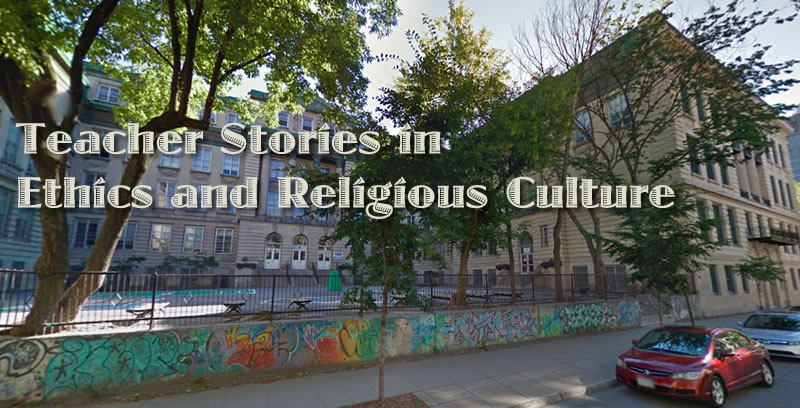
ERC Teacher Stories
Below you will find stories collected by ERC DEEN subcommittee: A series of interviews on how educators have approached teaching Ethics and Religious Culture in our schools. No two views are the same, but we have tried to keep the questions similar for each participant to share advice and resources.
Want to share your story here too? Fill in our online form here: Go to site ![]()
ERC Teacher Story 2016: Elementary ERC by Anne-Marie DeSilva
Sometimes hearing how other teachers have faced the challenge of teaching the ERC program is, well, just what you need to hear! This is the first in a new series of interviews on how educators have approached teaching Ethics and Religious Culture in our schools. No two views are the same (and likely you won’t agree with every one you read!) but we have tried to keep the questions for each participant the same.
First up, Anne-Marie De Silva – Former 6th Grade ERC Teacher, now Consultant @ EMSB
How long have you been teaching ERC Anne-Marie?
I actually only taught ERC for two years, before becoming the ERC consultant at the school board. I was on the validation committee in 2007 and was a facilitator for training teachers in 2008, so I already had some background. I am really grateful that I had the experience of teaching the course – many of those who worked on developing it did not.
What resources do you use? Share your best lesson!
I used LES rather than the textbook, as well as Zen stories from a philosophy book. They were good because they were short but thought-provoking.
The best lesson I ever taught was the LES on Gender Stereotypes, with my grade 6. They were the perfect age for that topic, as they were starting to feel the pressure to conform to adolescent gender stereotypes – in other words, they were living it. I meant it to last a month or so, but it lasted the rest of the year. We just kept coming back to it; the students kept bringing in new aspects or information, it was really gratifying and exciting as a teacher to see that level of engagement in all my students. Not just some of them – ALL of them.
What videos are you using?
I used a lot of Youtube videos on different holiday celebrations. I also had a series of DVDs called Holidays For Children, hosted by a soft-speaking guy a bit like Mr. Rogers, that included songs and crafts. They were intended for younger kids, but my grade 6 loved them, and insisted on doing the crafts.
What do you like best about teaching ERC?
In my earlier answer I mentioned the level of engagement from the students – as a teacher I have never seen anything like it. I think if you find the right content for your class, it is extremely fun for both students and teachers. I think this course lends itself to the classroom becoming a “community of research” that John Dewey suggested so many years ago – a place where everyone is learning together, and we don’t know where it will take us next.
What are the biggest challenges about teaching ERC?
Evaluation is challenging, with no formal exam and a lot of discussion and group work. The ERC teacher really has to plan ahead and consider specific things that can be marked during a project (not just at the end), so that the mark is based on valid data and not one single event.
Also the lack of time devoted to the course makes it hard to get continuity going. In elementary, the teacher can overlap it into English Language Arts if necessary; at the High school level it is trickier and involves real planning to make the most of the time you have.
Would you teach it again? What would be your ideal grade level to teach?
I would love to teach it again! In fact it’s all that I would like to teach. I would enjoy the challenge of teaching it to the oldest kids (sec 4 or 5), especially if they had some background from previous years’ ERC class. The whole curriculum could be current events (i.e. Donald Trump)! I know some high school teachers say the kids don’t take it seriously, but I would capitalize on the fact that it is a ‘relaxed’ course, and the pressure is off. Discussions are much more rich, and questions more authentic when it is not ‘for marks’, but instead it is real life.
ERC Teacher Story 2016: Secondary ERC by Rhonda Gibson
Today marks the second in our series on teacher stories from the Ethics and Religious Culture classroom. After reading our previous entry by Anne-Marie DeSilva about teaching ERC in Elementary School, long-time ERC teacher and program specialist Rhonda Gibson decided to offer a few words about her secondary-level experience. We went with the same line of questioning, and she offered her responses below.
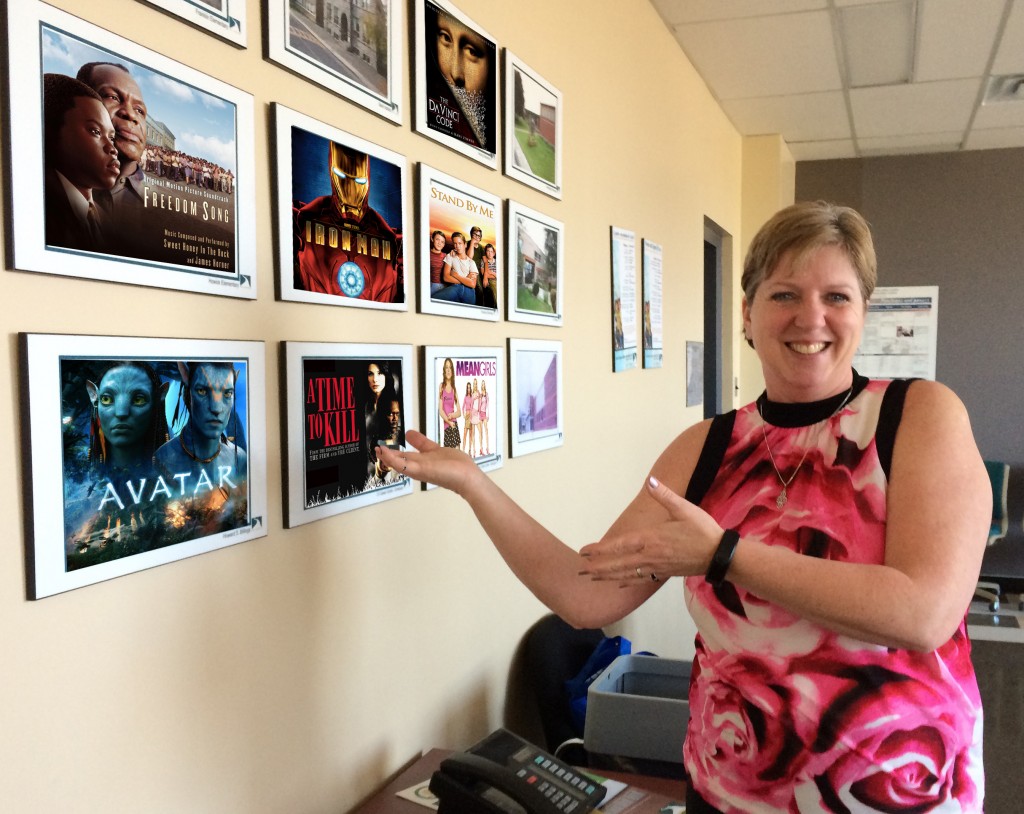
How long have you been teaching ERC?
I have been teaching ERC since its inception. I was part of the original team organized to create the program.
What resources do you use? Share your best lesson.
I have the unique position of teaching 4 grade levels so I can use spiral learning and track the progress through each grade. Resources vary from popular movies and NFB films to the internet to the library. One of my favorite spiral lessons begins in Sec I with a volunteer assignment. Under the theme of Social Awareness and Autonomy, students discuss their involvement in the world and what kind of effect it has on them and what effect they can have on it. We watch the movie Pay It Forward and they are given an assignment in which they must choose someone to help: family member, neighbor, anyone they choose. They must keep a journal of what they are doing to help, how their help has affected that person’s life and how they feel about helping. It is a 5-month journal with a minimum of 2 entries per month.
Sec II takes this concept a step further. They are now looking into helping outside their home or neighborhood. I encourage them to look for an organization or group to help. Ex. guides or scouts that they are a part of, their sport team, a local daycare, etc. The project is shorter but students are expected to manage a slightly larger task within the group that they are helping.
In Sec IV, Lake of Two Mountains High School is one of 8 schools in the province involved in the Youth and Philanthropy Initiative . This initiative encourages teens to become involved in local, grassroots charities in their neighborhood. The must interview and participate (volunteer) with that charity for a period of time and present their findings in a ten minute audio visual presentation. Topics that must be covered include history of the organization, staffing, resources, funding, and people that have been helped.
Sec V students take what they have learned from Sec I through IV and must create their own charity (theoretical). They must determine a target audience and follow the procedure of how to set the charity up: its needs, office space, promotion, funding, etc. This assignment is presented to the class in the format of shows like the Dragons Den and Shark Tank. There is an audio visual and written component.
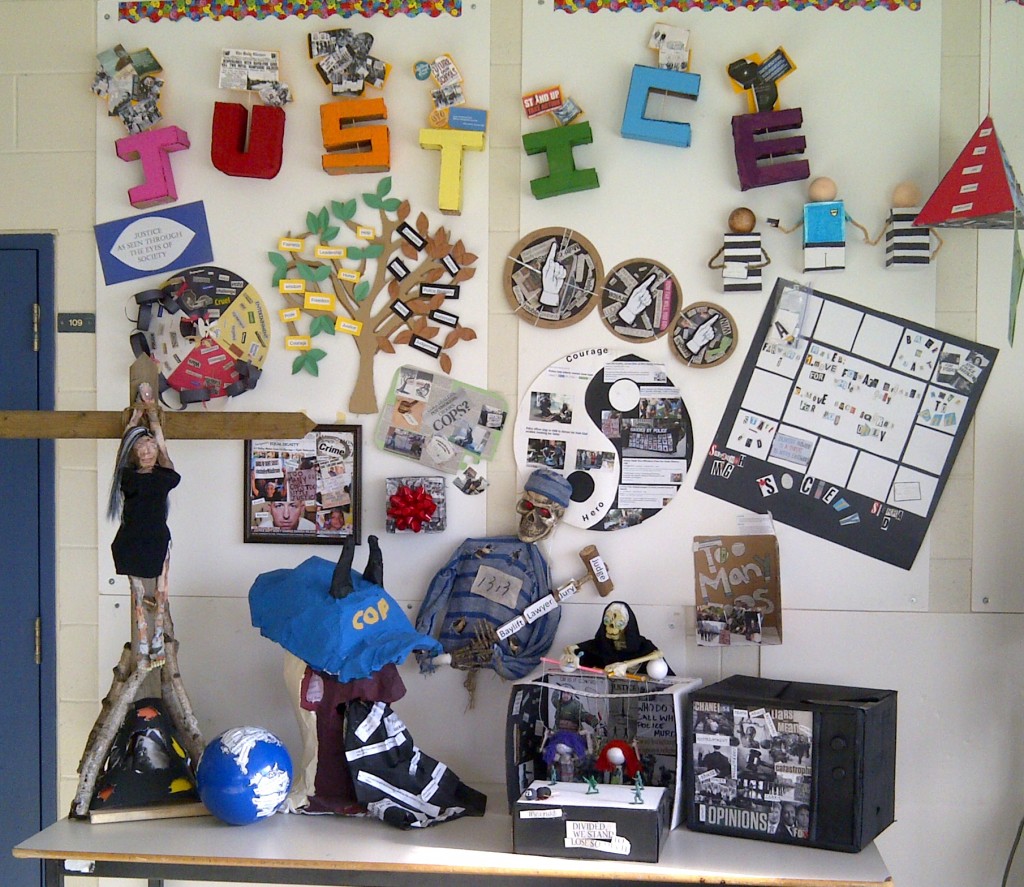
What videos are you using?
Sec I – Pay It Forward and Millions deal with doing something for someone else/selfless acts. Stand By Me– friendship and social autonomy
Sec II – Mean Girls – friendship, social autonomy, bullying Swing Kids – Human Rights
Sec IV – Avatar – Human Rights, Cultural/Religious tolerance Not Without My Daughter – Human Rights, Religions awareness/tolerance. The Great Debaters – Human Rights, justice, history. Freedom Song – Human Rights, Civil Rights, tolerance.
Sec V – A Time To Kill – Justice and Law. Iron Man – Justice and technology. The Da Vinci Code – Existential questions. Jericho TV series – covers just about everything in the senior mandate for this course. This is just an example of some of the videos I use. They may change from year to year depending on the interests of the students.
What do you like best about teaching ERC?
I like planting the seed and watching it grow. I like engaging the students, getting them expand their preconceived ideas and to realise that ERC is a life skills course and that it can be used in other subjects as well as life. Once they make that connection, the course becomes fun and easy. I often feel like I’m reinventing the wheel because each year brings a new crop of students with different interests and different ideas. If you have a bank of generalized lessons/topics, then you can dip into that bank to adjust to the kids you have. I have seen students use (ex.) the unit on human rights in their English or Geography classes, and the unit on Law in their Law class.
What are the biggest challenges about teaching ERC?
It’s not science. It’s not history (although it could be). It’s not French or math. It has no final exam, therefore, it is often not taken seriously. It is a course that is often parcelled out to teachers to fill in an empty spot in their schedule, therefore, the teacher does not put their full attention into it because their attention is on their own specialty. If the administration doesn’t see it’s value, how can the teachers, students and parents see it?
The original ERC teachers were specially trained. We took special courses and have a curriculum to follow like everyone else. It is a course that is easily cross-curricular and can be highly engaging. Its value needs to be respected.
Would you teach it again? What is your ideal grade?
Absolutely. I love this program. There is so much to it and so much you can do. Although I like all grades, I particularly enjoy the senior levels, Sec V. At this point, I have seen their growth from Sec I up and the pieces (for the most part) have fallen together. The light bulb is burning bright. It’s great to see.
ERC Teacher Story 2017: Elementary ERC by Jennifer Harriet
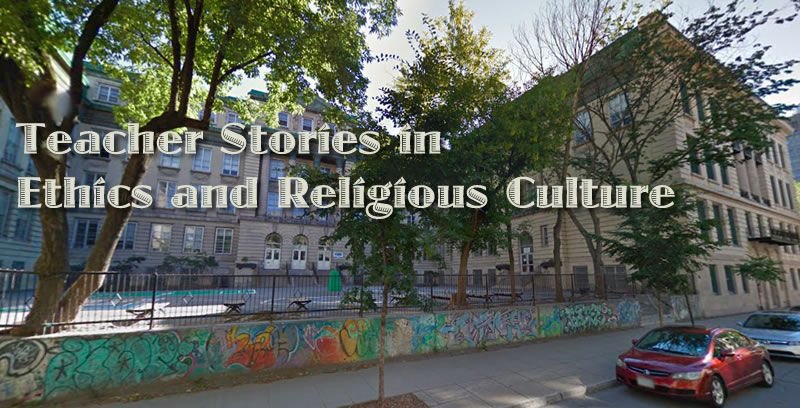
Another teacher story, this month by Jennifer Harriet of Face School in Montreal. Teaching the littlest ones has always been a mystery to me, with my only experience subbing at that level evolving into screams for bandaids every 5 minutes. I am in awe of teachers working with these first-time students, especially trying to incorporate an ERC focus. And in the case of this interview with Jennifer, I am even more impressed by how much fun she seems to have, and overjoyed to see the kind of love she gives her class. Enjoy Jennifer's responses to our questions, and consider using some of the resources and strategies she recommends! (PR)
How long have you been teaching ERC?
I have been teaching ERC for about 8 years
What resources do you use? Share your best lesson.
I use a variety of resources as I teach kindergarten so I try to incorporate ERC every week. Some of my resources include visits from our Spiritual Animator ( Samantha Smith) , using current events and relate important things to their level, and the students more importantly bring a lot of personal stories in which we use as a springboard to our discussions. Our routine in the morning includes our morning meeting. We do our calendar time and math activities but we also do team building activities or we talk about feelings. I also have an an activity called question of the day which is a bag full of questions that often requires goal setting, self- reflection and social stories. These questions are good springboards for discusions too. Kindergarten provides an ample opportunity to discuss kindness, empathy, different cultures, values and family. We talk about how we are unique and different from each other too. Pinterest is also of my favourite places to find things as well! I have a kindness board ( you can search for me under my full name).
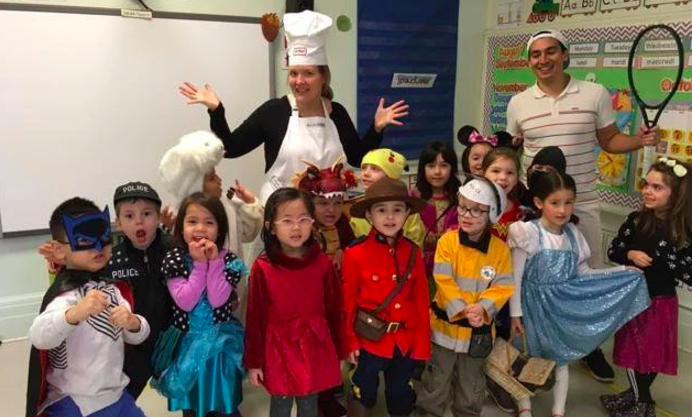
What videos are you using? Tell us more!
GoNoodle is a staple item in my class. I often use it to get my kids wigglies out and for movement breaks throughout the day. This website also has a great meditation section and calming activities too! [Youtube channel here. Calming playlist]
Anything from Kid president- Kid President is the perfect character to use to make kindness look easy and cool! His videos are a perfect combination of laughter and he provides insight on how easy it is to be kind. My favourite are his favourite ways to say something nice. I often model positive and encouragement language in my classroom to help them think positively. My favourite quote from Kid President is : I disagree with you , but I still like you as a person. This is one of my classroom’s motto. My students often disagree with each other on their favourite colour, toy, games, etc… and often surprisingly to us but normal for them, they get upset with each other. By using this motto and talking about it , they realize amongst each other that it is okay to not like everything our friends like and it they can still like each other! Small lessons but go a long way to help nurture our classroom community.
[Note: More videos for older grades too available by Soulpancake here)
What do you like best about teaching ERC?
I like how it is relevant to our world and expands their knowledge about each other. It is healthy to talk about this and eye opening too. My students become very aware of certain things and it is great to see how much they can retain and practice on a weekly basis.
What are the biggest challenges about teaching ERC?
Hard to find K resources. As it is not officially in the program, but I think it is a major component of preschool education in order to prepare our future generation. It is important to sensitize them as soon as possible to differences amongst us and in the world we live in.
Would you teach it again? What is your ideal grade and why?
Yes ! I like cycle 2 though too.I like Cycle 2 because there are clear objectives and more pedagogical resources that can guide your weekly lessons. In Kindergarten, I try to make it meaningful for them and try to expose them to as much as I can. I really do enjoy the fact that I am with them all week and I can decide when I want to do ERC activity without time constraints. That makes it much easier!
ERC Teacher Story 2017: Secondary by Francine Massue
Another in the series of interviews with various Ethics and Religious Culture teachers, this one is with Francine Massue. An accomplished history teacher and someone who has an active online presence, Francine has also recently taught ERC. As you will see, she has many ideas and resources to share. Enjoy!
How long have you been teaching ERC Francine?
I taught ERC for 2 years with Secondary 1 and 2 high school students at Heritage Regional High School.
What resources do you use? Share your best lesson.
I feel that one of my best lessons has to do with the students creating their own superhero and attributing positive values to the character they developed. The goal was to have the students identify qualities that demonstrates a strong ethical character. In addition, they were to explain how they could incorporate these qualities into their own lives. The quality of work was amazing and creative and at times very humorous.
The resources are varied from videos to reading picture books to games to creative drama to videotaping skits.
What videos are you using? Tell us more!
Most videos come from YouTube. I look for short video clips such as 'What Would you Do?" (visit http://francinemassue.weebly.com/what-would-you-do.html ), These help support the Values theme of ERC. In addition, the incorporation of Moral Dilemmas through videos and Survivor games (see https://youtu.be/pihwQF2qvSs) is always a valuable asset as well.
The Media Influence theme is best served by videos like the ones posted on my site at http://francinemassue.weebly.com/secondary-2-media-videos.html, including of course the popular Dove video of the model who is transformed through graphics. See it at Evolution video: the use of airbrushing and Photoshop in the media. The discussion that comes from those clips is astounding and help focus the students on the importance of ethical issues and choices that surround them everyday.
What do you like best about teaching ERC?
I actually thought that I would not like teaching Ethics when I first saw it on my schedule. I had a vision of what ERC was and thought that there would be no room for innovation and creativity. But it turned out that I was very wrong. I was not only able to create lessons based on the Ministry Objectives but to also to structure them towards issues that were prevalent in the classes.
In addition, one year I developed projects with the students that focused on helping people in the community. One group created bags of games and toys from scratch for sick children at Charles Lemoyne Hospital in Greenfield Park where we were able to visit and distribute to some very young children and families. What an amazing experience for everyone - to see smiling faces of the sick children to the sense of community and satisfaction of helping others on the faces of our own students.
What are the biggest challenges about teaching ERC?
The biggest challenge was organizing my lessons since I only saw the groups once a week. Time management is an issue and I do remember that there was one term where I had seen the groups for only six sessions. I do believe that combining Ethics with English or History instruction would result in more efficient transfer of knowledge and deeper understanding of concepts, theme and values. For instance, the students could be reading the novel Hatchet by Gary Paulsen in English where the theme of perseverance could be combined in Ethics with Growth Mindset (Carol Dweck https://youtu.be/KUWn_TJTrnU ) activities that can help students understand that learning and life does not have to fixed but can be changed over time. In History, lessons about Greek Democracy in Secondary 1 can transfer over to Ethics class and discussion about how people live in the world and choices that people make in their lives. Although combining courses at the high school level can be very challenging due to scheduling issues working together with other teachers to develop activities could be very beneficial.
Would you teach it again? What is your ideal grade?
Yes and yes. I would enjoy teaching ERC again. I also believe we should create lessons geared towards each individual class to make ERC more effective. I definitely like teaching Cycle 1 students since I find them to be excited by trying out new activities in class.
ERC Teacher Story 2017: Primaire ECR par Audrée Anne Dupont
Another in our series of teacher stories, this one comes from Audrée Anne Dupont a teacher of 6th grade French at Merton School, a neighborhood French Immersion school located in the predominantly English municipality of Côte St-Luc. She submitted her responses to my questions in English, but when I asked her to elaborate for this article I encouraged her to rewrite in French, or Franglais, or whatever she wanted. It's an interview, and that is our reality in Montreal and other places in Quebec, I said. But more importantly, there are a lot of other teachers in situations exactly like hers, either teaching in immersion settings or in schools whose bilingual format does ERC in French. (And you can always try this article on Google Tranlate if you want!)
So let’s see how Audrée Anne has, as she says, come to “adore” the Ethics and Religious Culture program.
Paul: Can you elaborate on “what resources do you use?” Share your best lesson.
Audrée Anne: J'utilise certains textes du manuel Symphonie (pour 6e année). J'ai déjà utilisé le manuel Autour de nous lorsque j'enseignais en 4e année. Je prends aussi des activités et des textes dans des cahiers des éditions À Reproduire ainsi que différents documentaires (ou encyclopédies). J'adore utiliser la littérature jeunesse en classe, plus spécialement les albums qui peuvent susciter de riches discussions. Je fais de la pluridisciplinarité en classe étant donné que j'enseigne plusieurs matières telles le français, les arts plastiques et l'histoire et la géographie. Toutes ces matières peuvent être reliées. Je trouve parfois des idées intéressantes sur des groupes Facebook.
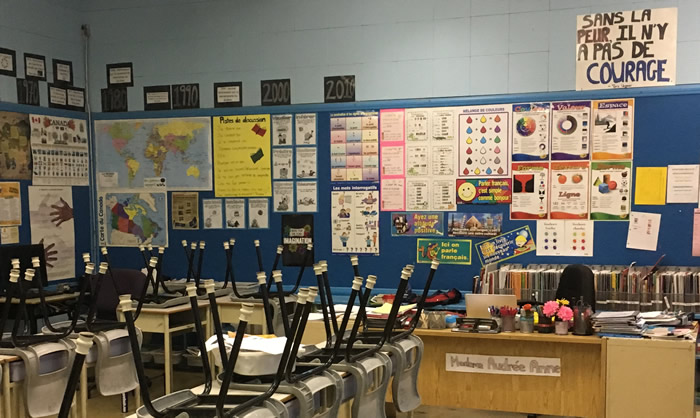
Je suis particulièrement fière des activités faites sur le mois de l'Histoire des Noirs. J'ai présenté 3 albums différents: un sur la vie de Rosa Parks (Le bus de Rosa), un sur la vie de Nelson Mandela (Mandela) et un qui raconte une partie du discours de Martin Luther King (I have a dream). Nous avons discuté de leurs réalisations et avons fait des liens entre eux tout en parlant du mouvement des droits civiques. Il y a eu plusieurs discussions intéressantes et de belles réflexions de la part des élèves. Nous avons parlé de l'importance de la tolérance et du respect (et la richesse) des différences. Pour terminer, nous avons écouté la chanson Soleil du chanteur Grégoire et réfléchi sur son message. J'aborde ensuite le thème du rejet et de l'intimidation en classe. Puis, je termine l'année avec le thème de la Deuxième Guerre Mondiale et l'Holocauste. Il y a donc une gradation dans les thèmes abordés en classe.
Voici la liste des albums utilisés lors du Mois de l’Histoire des Noirs:
-Homme de couleur! de Jérôme Ruillier (comme introduction au sujet)
-La détermination de Viola Desmond de Judy Nyasha Warner (une histoire canadienne)
-Lettre à mes filles de Barack Obama (pour les autres personnes inspirantes nommés dans son texte)
-Nelson Mandela de Kadir Nelson (disponible en anglais sous le même titre)
-I have a dream – Martin Luther King – dessins de Kadir Nelson
-Le bus de Rosa de Fabrizio Silei
-Mohamed Ali - Le champion du monde de Jonah Winter (une autre histoire intéressante)
-Nina de Alice Brière-Haquet (l’histoire de Nina Simone - un lien peut être fait avec Martin Luther King qui est mentionné dans cet album)
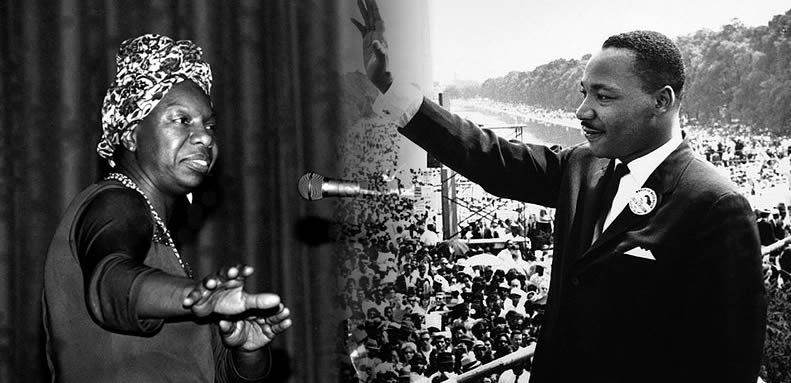
Je lis ces albums aux élèves à voix haute, en lecture interactive. Les élèves arrêtent et discutent en partenaires (turn and talk) à certains moments clés dans les histoires. Ils doivent aussi partager leurs pensées avec le reste de la classe. Ils écrivent aussi dans leur “journal de lecture” quand je leur demande une question et que je veux des traces écrites.
Paul: And what about the “videos are you using?” Have you used videos in class?
Audrée Anne: J'ai déjà utilisé le vidéo La danse des brutes de l'ONF. J'aimerais trouvé d'autres courts vidéos présentant les différentes religions qui seraient adaptés pour mes élèves.
Paul: Obviously you’re more of a book person. But you are right, one needs to find videos that are adapted to our students. Now that we no longer have free access to Discovery videos it makes it more of a challenge. NFB has The Faith Project http://thefaithproject.nfb.ca/ but even I haven’t had time to fully explore that site. And now LEARN offers Curio.ca videos for every member, so you could also try logging in at LEARN then clicking the button to visit their collection. There might be some age-appropriate videos in there, but for sure it is not obvious with the younger ones.
Audrée Anne: Quelle excellente idée! Adapter peut parfois prendre beaucoup de temps, mais je crois que regarder les vidéos pour enrichir mes connaissances personnelles sur le sujet est tout aussi important
Paul: What do you like best about teaching ERC?
Audrée Anne: J'aime voir l'étincelle de curiosité dans les yeux de mes élèves et la soif d'en apprendre plus. De plus, je peux avoir des discussions intéressantes avec eux et mes élèves me surprennent parfois par la qualité de leurs réflexions. Cela me motive à chercher d’autres activités enrichissantes et motivantes pour eux… et pour moi!
Paul: What are the biggest challenges about teaching ERC?
Audrée Ann: L'évaluation est ce qui est de plus difficile. J'aime avoir des discussions avec mes élèves et je me laisse emporter autant qu'eux dans les discussions. Il est difficile alors de prendre des notes et des observations sur le vif. Avec la technologie, il est maintenant plus facile de garder des traces, mais il faut y penser sur le moment.
Paul: Would you teach it again? What is your ideal grade?
Audrée Anne: Bien entendu! J'adore enseigner en 6e année du primaire.
Note: To see all our Teacher Stories reload this page
ERC Teacher Story 2017: Elementary ERC by Amanda Rose

One of our first respondents when we sent out the call for Teacher stories this year was Amanda Rose from the Drummondville Elementary School, a part of the Eastern Townships School Board. As should be obvious if you’ve been following our teacher-stories series, Amanda responded to the same series of questions, and she did it in time to get one of LEARN bags of promotion goodies from the boards. Congrats to Amanda!
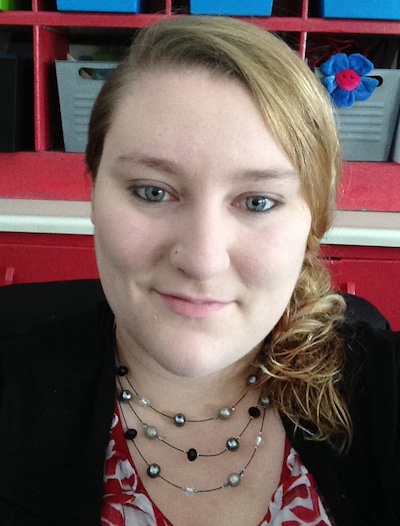 Here is what she has to say about teaching ERC in elementary school!
Here is what she has to say about teaching ERC in elementary school!
How long have you been teaching ERC?
I am new to the profession of teaching. I have been teaching ERC for 4 months for this year on a replacement contract for grade 2 and 3. I was also teaching ERC during my fourth year practicum for grade 3/4. I would really enjoy an opportunity to teach ERC in cycle 3. I was really excited when I learnt that I would be teaching my grade 3 class ERC, as well as the grade 2 class because I would be able to study more stories from different religions around the world allowing me to learn with my students.
What resources do you use? Share your best lesson.
My favourite resources I like to use are videos (mostly on Youtube); videos that are geared towards elementary students. I really enjoy using videos because I feel that a lot of my students do not have prior knowledge about different religions, and videos are a great tool for a hook, and to keep the students engaged and asking questions. I enjoy focusing on different key aspects of a holiday and allowing my students to explore the experience deeper. There are also different activity sheets that I have been able to find online through different websites. My favourite thing about teaching ERC is when the students ask questions. Sometimes I am unable to answer the questions right away, but that is okay. We are able to learn together as we go. My best lesson so far this year, is when we were studying Raksha Bandhan, this is a celebration of brothers and sisters. As a class we learnt about Hinduism and after we were able to make bracelets as is customary as part of the celebration, all the students were excited to share what they had learnt with their siblings.
What videos are you using? Tell us more!
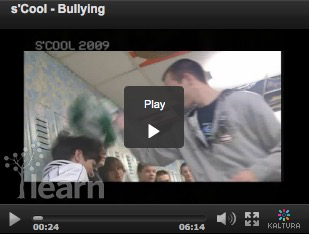 I enjoy using different videos on youtube. Different videos from Beginner Bible, Introduction to Hinduism, BBC, and other videos that I can find on tourism websites as well. For the ethics, section of the QEP, I enjoy using videos about bullying (usually with no words; allows students to use nonverbal cues) and different scenarios in which the students have been in personally or that they can easily relate to. I enjoy doing this because it allows for a very engaged conversation afterwards, I find that bullying is something that has been discussed enough that all the students have something to share. This is what I love about the ERC program, is that it allows us to have the students speaking and sharing verbally with others in the class, giving the students a more concrete understanding of the character traits we talk about in the class.
I enjoy using different videos on youtube. Different videos from Beginner Bible, Introduction to Hinduism, BBC, and other videos that I can find on tourism websites as well. For the ethics, section of the QEP, I enjoy using videos about bullying (usually with no words; allows students to use nonverbal cues) and different scenarios in which the students have been in personally or that they can easily relate to. I enjoy doing this because it allows for a very engaged conversation afterwards, I find that bullying is something that has been discussed enough that all the students have something to share. This is what I love about the ERC program, is that it allows us to have the students speaking and sharing verbally with others in the class, giving the students a more concrete understanding of the character traits we talk about in the class.
What do you like best about teaching ERC?
I enjoy teaching ERC because it allows my students to have exposure to different cultures. It is amazing for students to see how other children around the world live their lives. I like when students become fascinated and ask me to teach them more from different religions.I teach in a rural area in the east end of the Eastern Townships School Board, and a lot of my students have not heard about the different religions that we have studied and are continuing to study. One of the students’ favourite lesson that I have taught, is from the Hindu religion, it is a celebration named Raksha Bandhan ( it is a celebration of bonds that brothers and sisters share). After we learnt about the religion and celebration, we were able to make bracelets. The class was very excited to be able to share what they had learnt about the holiday with their own brothers and sisters. I found that after when we were able to discuss what we had learnt the students were able to tell me every fact that they have learnt about the religion because they associate it with making the bracelet.
What are the biggest challenges about teaching ERC?
Some of the biggest problems that I have encountered while teaching ERC is the availability to create LESs around specific topics and themes that can be found throughout different religions, as well as finding the resources that are needed to complete the lessons. I also find it challenging to engage the students in some lessons when the students have no prior knowledge on the topic. I also enjoy teaching students about the history and where certain holidays originate from, however there is a lot of violence, so it is difficult to find some materials for students that is not violent. I find that my students are really interested in why people celebrate different holidays and festivals around the world, that there is a specific reason for the activities and holidays that we celebrate today.
Would you teach it again? What is your ideal grade? *
Yes ! I would love to teach ERC again. I feel like the more I teach the subject, the easier it becomes to find new and creative ways to engage students. I feel like it is difficult sticking to the 1 hour a week allotted for this subject. I enjoy making it cross curricular. I really enjoy teaching ERC to cycle 2 (grade 3 and 4). I have never been able to teach ERC to cycle 3, however I would really enjoy an opportunity to do so.
ERC Teacher Story 2017: Elementary ERC by Rosalba Servello
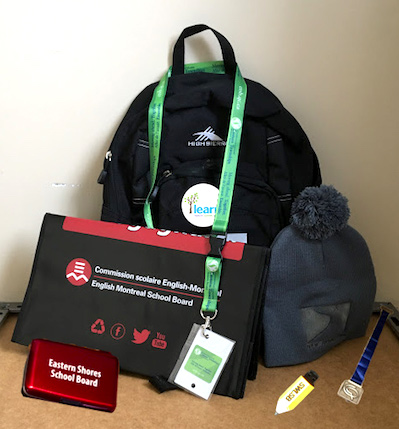 One of the first to respond to our call for ERC teacher stories this year was Elementary English Montreal School board teacher Rosalba Servello. And she was the first to receive one of six LEARN knapsacks with all kinds of goodies, courtesy of the board consultants on our DEEN sub-committee.
One of the first to respond to our call for ERC teacher stories this year was Elementary English Montreal School board teacher Rosalba Servello. And she was the first to receive one of six LEARN knapsacks with all kinds of goodies, courtesy of the board consultants on our DEEN sub-committee.
Again, the purpose of our survey and “contest” of sorts was for other teachers to get an idea of what they might do in class by hearing from their peers. Even if it seems simple or obvious to an experienced teacher, the reality is that many teachers are just thrown into teaching ERC and don’t have any idea. The teachers stories show them some first steps, and that they are not alone.
“I do agree that it is quite a challenge teaching ERC” said Rosalba. “But I think every teacher does their best in making it interesting.” What follows are the questions she was posed including a back-and-forth to get at some of the ways Rosalba makes it interesting for herself and her students.
How long have you been teaching ERC?
I have taught ERC for over 6 years. I've been teaching ERC for 3 years at my present school. I also taught ERC for 3 years at my previous school.
What resources do you use?
Can you share your best lesson and describe some of the materials and strategies you used?
I use many resources. I use Les Editions ECE plus my own material that I have accumulated throughout the years. My favourite lesson is using the text "Don't Laugh at Me" by Steve Seskin and Allen Shamblin. I learnt about this book at my previous school where the students were so engaged every time the Spiritual animator would present it. I bought the book myself and have used it every year for Anti-Bullying. The video is free online so it is accessible to everyone.
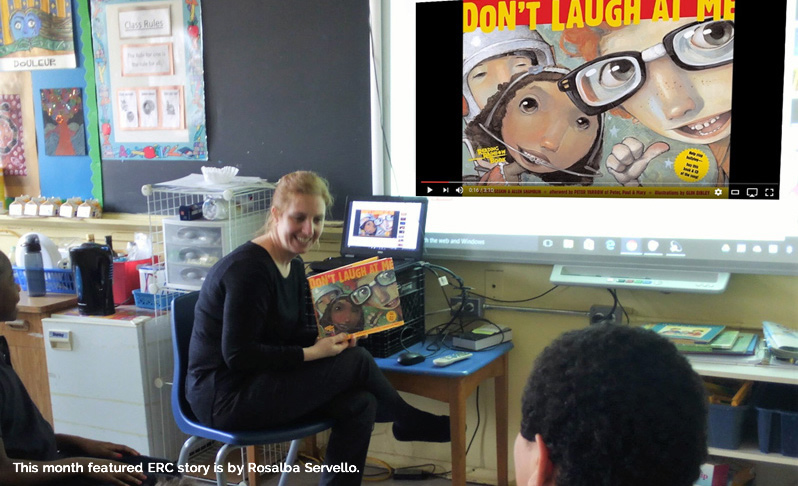
What videos are you using in class? Any favourites?
I use videos sent by our Ethics consultant as well as those I find myself online. My favorite one is the one that accompanies the book "Don't Laugh at Me". The students enjoy this video every time I show it.
What do you like best about teaching ERC?
I enjoy the discussions I have with the students. Particularly the younger grades. They always make our conversations interesting. I find that the students have a lot to share and can contribute a great amount of knowledge to the lesson.The students always bring their life experiences to the discussion. They are so open and honest. They share their opinions without reservation.
What are the biggest challenges about teaching ERC?
Finding lessons that pertain to the holidays is always a challenge. It's always difficult finding fun lessons that will keep the students interested. I have to research often because I don't like to do the same lesson every year. I also find teaching ERC for an entire hour is quite a challenge, especially with the younger grades.
Would you teach it again? What is your ideal grade?
I definitely would teach ERC again. I really enjoy teaching cycle 1 and 2 at the elementary level. As I said before, I enjoy listening to their discussions and all the information they have to offer. They discuss their feelings openly and don’t hide their opinions.
ERC Teacher Story 2017: Secondary by Natasha Beaudoin
How long have you been teaching ERC?
I have been teacher ERC for 8 years
What resources do you use? Share your best lesson.
I use a lot of true stories such as the polytechnique massacre, Nelson Mandela, Martin Luther King Jr., Mother Teresa, etc. and discussion based questions to let the students think and reflect first then we spend a lot of time discussing issues in class, this is when I use videos such as What Would You Do?
What videos are you using? Tell us more!
I use movies such as Remember the Titans, Invictus, The Help, Hairspray, Deep Impact, The Da Vinci Code, V For Vendetta, Polytechnique and more. These movies cover topics such as racism, fattism, sexism/misogyny, dealing with corrupt governments, how religious symbols can add meaning to art, end of the world theories and more.
What do you like best about teaching ERC?
I can have the same reflection written for 4 different groups and never have the same discussion. Often times, the students bring up thoughts that would never have crossed my mind and therefore I learn from them on a day to day basis. For example, one of my students a few years back brought up in a discussion about how some people deal with dress code violations with the phrase “you are distracting the boys”, he discussed that these phrases not only paint the girls in a bad light but also men as they are pictured as these hormonal, inherently unable to control themselves creatures.
What are the biggest challenges about teaching ERC?
The challenges are when a student is close minded or feels superior to others and behaves in an unbecoming way (homophobic, racist remarks, etc.) and the fact that it is only taught twice in a 9 day cycle. There is so much to discuss but very little time to do it. I have found that basing the class around discussion allows a bit more leeway or having immersive projects that cover many points. What would be ideal though would be to have more time to teach this course.
Would you teach it again? What is your ideal grade and why?
I love teaching it, I love being the Pedagogical Coordinator for it and I love teaching the Secondary 4 and 5 course. I became a Coordinator because I wanted to fight for a program that I see as being essential to the growth of children. I have used inspiration from different sources such as workbooks I bought at QPAT but by and large I have created all my own material.

 FACEBOOK
FACEBOOK TWITTER
TWITTER
 INSTAGRAM
INSTAGRAM LINKEDIN
LINKEDIN